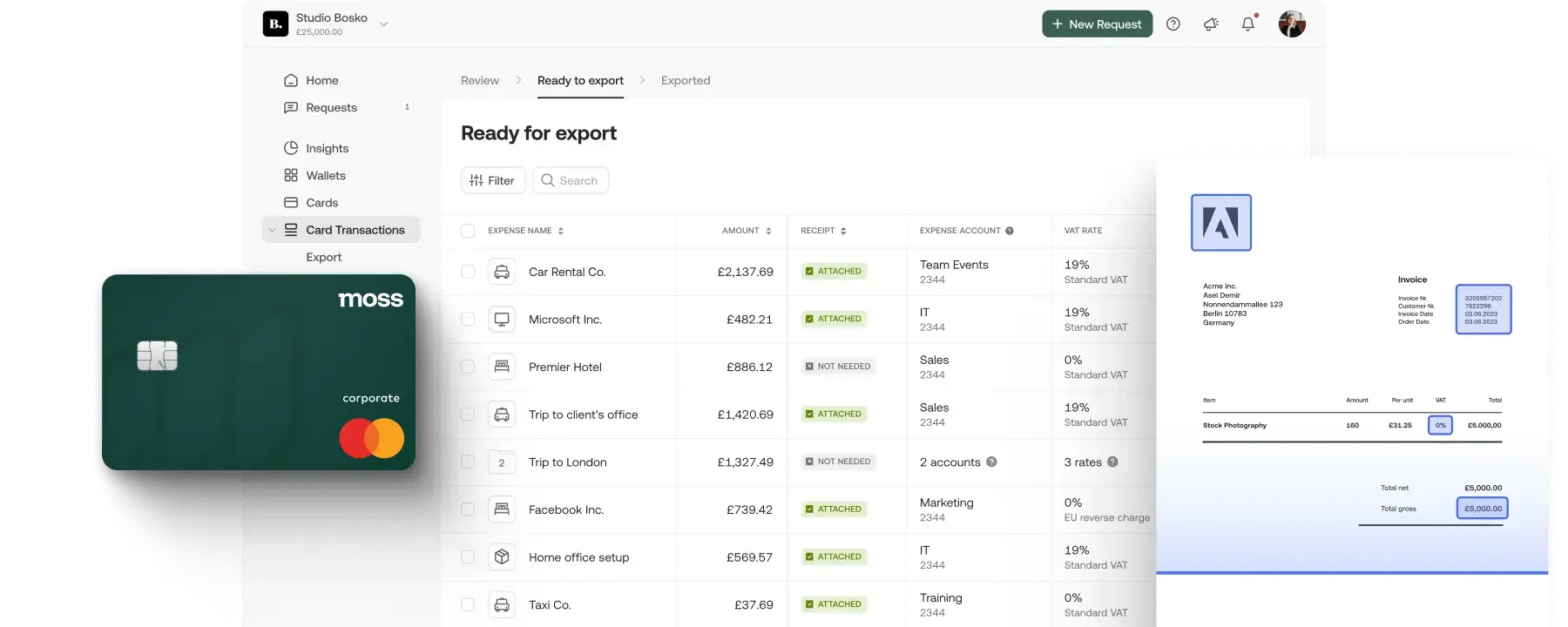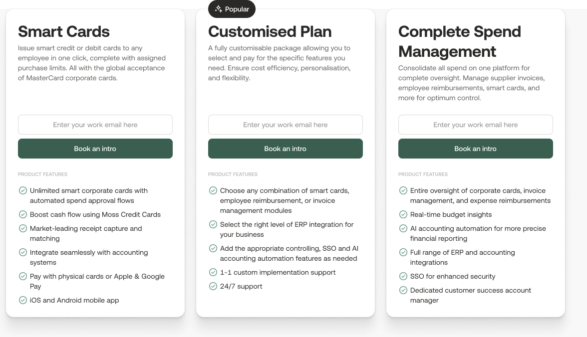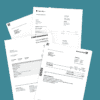Business trips are often a welcome change from the daily office routine or working from home. However, they are always associated with costs and subsequent administrative work to settle the corresponding expenses. We provide an overview of what employees need to consider when it comes to travel expenses and how they can best benefit from tax exemption.
What are employee travel expenses?

Travel expenses arise from work-related activities away from the place of residence and the primary place of work. The primary place of work is considered to be the place where the employee works on a regular basis. If companies bear the costs for such business trips by employees, they can be deducted from tax under certain circumstances. If the conditions are met, business trips are exempt from tax. Both the employee and the employer can benefit from this if they provide evidence of the travel costs incurred.
But what kind of costs count as travel expenses? In summary, these are all costs that incur during the trip and serve to ensure its successful completion. This means not only travel costs, but also expenses for food and accommodation to keep up one’s strength. In addition, there are ancillary travel expenses such as parking fees and telephone charges.
Which travel expenses can employees claim?
- public transport
- hotel accommodation
- food, as well as drinks
- congestion and toll charges
- parking fees
- professional telephone calls
- printing costs
- mileage
If these expenses are incurred during a business trip and for business purposes, they can be exempted from tax. Expenses of a private nature that arise during a business trip, for example from a private visit to a museum, cannot be claimed.
Employee travel expenses reimbursement

If employees want to settle their travel expenses, they have several options. The most profitable one: they forward their travel expenses in full to their employer, submit all the relevant receipts, and the employer transfers the total amount to the employee’s account. The employer can then post the expenses and have them exempted from tax.
In case the employer is reluctant to pay for the employees’ travel expenses, they can reclaim the tax from the government themselves under certain conditions. However, to claim back the tax, HMRC has specified certain rules for employees:
- The travel expenses exclusively incurred for work-related reasons.
- The employee has covered these travel expenses personally.
- The employer does not reimburse the employee for the travel expenses.
- The employer has not provided the employee with a suitable alternative.
- The employee pays taxes.
To benefit from tax exemption on certain expenses, the employee must of course be a taxpayer in the first place. To claim tax exemption for expenses, these must be submitted with supporting documents to HMRC within four years of the end of the tax year in question.
When is the trip a business trip?

To understand under which conditions employees can deduct their travel expenses from tax, it is first necessary to clarify what actually constitutes a business trip – and what does not. For HMRC, there are two permissible types of business travel. Option one: the traveller visits a customer in another city on behalf of the company, for example, to maintain contacts – a time-limited trip that serves a specific purpose. Or the employee travels to a certain location to carry out work: e.g., a construction site or a temporary workplace such as a branch office.
The daily commute from home to the permanent place of work, however, is explicitly not considered a business trip and cannot be recognised for tax purposes. Furthermore, if you do not travel from home to your usual place of work in the morning, but to another place that is the same or a shorter distance away, this travel cannot be exempt from tax either – only business trips that go beyond the usual distance.
Permanent or temporary workplace compared
The duration of the employee’s activity at a specific place of work is the decisive factor for the question whether a trip to work is tax-deductible or not. Commuting to the permanent place of work – for instance, to the office where the employee usually works and which is mostly specified in the employment contract – is not deductible from tax. However, if the employee must work temporarily somewhere else, for example at a branch office in another city, the journey to this place can be claimed for tax purposes. But this only applies for 24 months: if the employee is required to work there for a longer time, the place is considered to be the new permanent place of work.
When does work from home turn into a permanent workplace?
Since the onset of the corona pandemic in 2020, work from home has become increasingly popular. More and more employers are allowing or even encouraging their employees to work from home. It is becoming very common to let employees choose their preferred place of work themselves. But what does this mean for employees in terms of tax?
It depends: if the employee only works from home because of a personal decision, every trip to the office is considered commuting – and is thus not tax-deductible. But if the employer decides that the employee must work from home – for example, because there is no office at all anymore – the home office is the new permanent workplace. Every trip to another place of work then becomes a business trip and is deductible from tax.
Which travel expenses can be deducted by employees?

Not all kinds of expenses incurred on a business trip are tax-deductible. Private costs arising from a business trip may not be submitted to HMRC. It is not always that easy to distinguish between private and business-related costs – often the transition is fluent. So: what is deductible and when?
The expenses being deductible are:
- work-related travel not to or from the permanent workplace
- dinner and breakfast when a business trip runs overnight
- accommodation costs during a several-day business trip
- food and drink on a business trip; either the actual costs or the fixed rates set by HMRC
- all travel expenses related to official business, such as: public transport, congestion, toll and parking charges, telephone calls, printing costs, etc.
Non-deductible are:
- the regular way to the permanent workplace
- travel expenses not strictly related to work, e.g., the private visit to a museum, a sightseeing tour, or recharging a travel card
- penalty charges, e.g., tickets for illegal parking or speeding
Costs for food
To keep your strength up on a business trip, daily meals obviously play a crucial role. However, when away from home, it is difficult to cook or prepare food on your own, which is why frequent restaurant visits are customary. But: HMRC does not automatically exempt every restaurant visit. Instead, it has set limits up to which the costs can be deducted each day.
The respective limit depends on the length of the journey.
| Minimum length of the trip | Maximum meals expenses |
| 5 hours | £5 |
| 10 hours | £10 |
| 15 hours | £25 |
There is also a cap of £5 for breakfast. For dinner after 8pm the cap is £15.
Business travel mileage
If employees use their own vehicle for business travel, they can, up to certain limits, recover the costs from their employer – who in turn can claim them for tax purposes. Employers can pay the so-called “approved amount” without having to report it to HMRC. These payments are referred to as mileage allowance payments.
The approved amount is calculated by multiplying the employee’s annual mileage by the rate applicable to the vehicle. This rate depends on two factors: the type of vehicle and the total number of miles driven on duty.
| First 10,000 miles | Above 10,000 miles | |
| cars and vans | 45p | 25p |
| motorcycles | 24p | 24p |
| bicycles | 20p | 20p |
Up to the approved amount, the employer can bear the employee’s expenses without having to declare this to HMRC. If, on the other hand, more expenses are covered, these additional costs are considered as employee salary and lead to corresponding tax payments.
If the employer does not pay the mileage allowance payments or not the full amount up to the approved level, the employee can claim the difference for tax exemption – also known as mileage allowance relief. In other words: the employee’s business travel mileage is either paid in full by the employer or the employee can claim tax exemption.
Moss: business travel made easy

Those who have completed a business trip do not want to spend a lot of time afterwards settling their travel expenses, submitting applications to their employer, or having to go through the hassle of declaring them in their tax return.
With Moss, there is a way to help employers to make work easier for their employees: through smart expense and invoice management that makes expense reports obsolete. This is because Moss gives employees the freedom to pay for all work-related expenses independently and responsibly during a business trip using a corporate card. Thus, travellers do not have to lay out the costs for accommodation, food, and transport, but can conveniently pay with a real or with a virtual corporate card – with an individual budget limit precisely tailored to the trip.
All receipts from the trip can be uploaded instantaneously via the web or mobile app – and the tedious expense report becomes completely superfluous. This allows employees to focus entirely on their work from the beginning to the end of the trip. It also saves time for the accounting department.
FAQs
Employee travel expenses are costs incurred by an employee on a business trip – for example, for means of transport, meals, or accommodation. The trip must be work-related and the external work assignment must not last longer than 24 months. Otherwise, the travel destination is considered a permanent place of work to which a trip is not tax-deductible.
Employees can either have their travel expenses reimbursed by their employer or submit them to the tax authorities themselves to benefit from a tax exemption. To have the costs reimbursed by the employer, all receipts for the trip must be collected and passed on. If the employee pays the costs personally and is indeed a taxpayer, a tax exemption can be claimed from HMRC.
All costs incurred on a business trip for professional reasons can be deducted – from transport costs to toll and congestion charges or parking fees to meals. This also includes overnight stays, charges for business telephone calls, or printing costs.
If employees use their own vehicle on a business trip, they can either have these costs covered by the employer or have them exempted from tax. The annual amount is calculated depending on the number of miles travelled and the type of vehicle.
For a business trip, you can either claim lump sums for meals or the actual costs – but only up to a certain limit. For a journey of 5 hours or more the limit is £5, for 10 hours or more it is £10 and for 15 hours or more it is £25. Breakfast can be deducted at £5 and dinner after 8pm at £15.
A business trip is defined by HMRC either as a short trip with a clear purpose – such as meeting a client somewhere other than the permanent workplace – or a longer trip to another place of work, such as a branch office. However, the maximum length for such external duty is 24 months.








